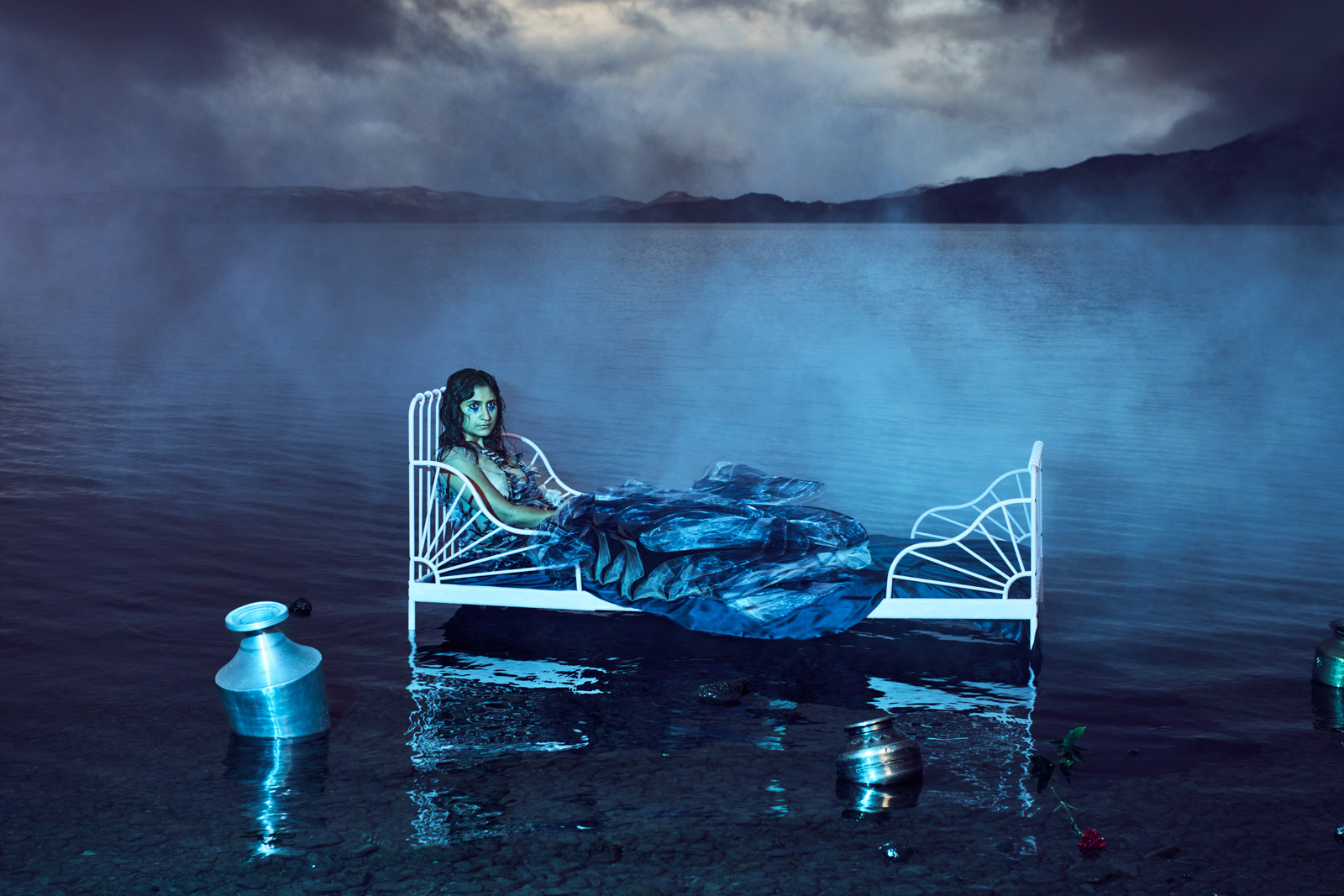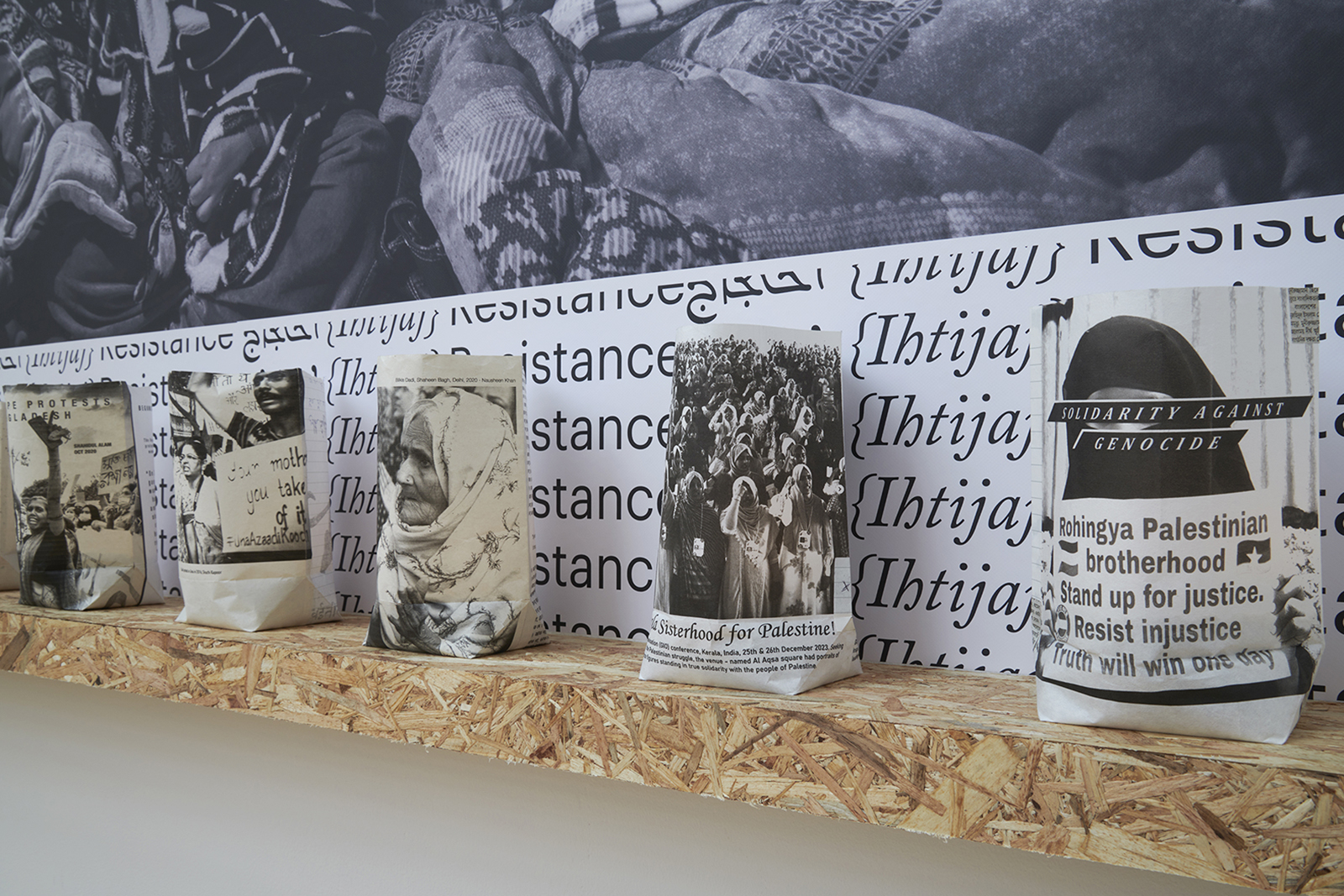‘This is just the beginning, revolutions take time’: the artists capturing women’s resistance
South London Gallery is showcasing female artists who challenge traditional protest photography
–

“If you want to change the world then it has to come from the ones who are most oppressed,” says visual artist Poulomi Basu.
This tension lies at the heart of the South London Gallery’s current exhibition, Acts of Resistance: Photography, Feminisms and the Art of Protest. The exhibition showcases the work of 16 international artists who focus on women’s rights struggles over the past decade, from the #MeToo movement and the campaign to end female genital mutilation (FGM), to protests against sexual abuse and restrictive abortion laws.
The artists defy the ways protest is usually visualised on camera, and instead present a creative response to the biggest issues of our time from those with lived experience.
Basu, 40, from the Indian city of Kolkata, uses dramatic self-portraits set in a dystopian landscape to show the impacts of being denied clean water, toilets and sanitary products. Titled Sisters of the Moon, her series explores the relationship between bodies and systems of power. She draws parallels between the destruction of the earth’s elements and women’s rights in developing countries.
She defines her work as an intersection of her own experiences of sexual and domestic violence, and other women who are on the frontline of climate change in the global south.
“Growing up as an Indian woman I know how exclusively misogynistic south Asia is, and how patriarchy dominates our entire life and existence. That oppression doubles up when you have a low income and not many resources,” she says.

The exhibition also features the work of Hoda Afshar, an Iranian documentary photographer based in Australia. Her poetic suite of supersized portraits, from the series In Turn, are hung from the ceiling, marking the centrepiece of the show.
“I was born after the Islamic Revolution in 1979 and grew up in the tension. I had to struggle with the level of control and oppression especially on women’s bodies,” says Afshar.
In Turn responds to “Jin, Jiyan, Azadi” — “Women, Life, Freedom” — a Kurdish slogan that became a rallying cry for anti-government protesters in Iran after the death of Jina Amini in police custody in Tehran in 2022. Amini, a 22-year old Kurdish woman, died after being detained and, according to witnesses, brutally beaten by Iran’s morality police for not wearing the hijab in line with the country’s law.
“During that period, it was really hard for me to watch what was going on in Iran from afar because it was the first time we perceived young women so bravely standing in the face of the tyrants and screaming in the faces of the morality police and guards who are quite scary,” says Afshar.
“A lot of the women were arrested and killed. It was shocking. So at that point I felt it was my responsibility to use my platform to speak about what was happening. That’s when I decided to create these portraits.”
The portraits include symbols from images that circulated on social media in solidarity with the women of Iran. In particular, the motifs of hair plaiting and white doves speak as a mechanism of defiance and remembrance.
“Kurdish female fighters would sit around in the mountains and plait each other’s hair before going to fight against the Islamic State and Daesh, so I wanted to capture the juxtaposition of the power of women, hope and the risk of losing their lives,” Afshar adds.
Before migrating from Iran to Melbourne in 2007, the 40-year-old had a traumatising experience when she was held by the morality police. “The first time I was arrested was when I was 15. They drag you from the streets and put you in a van. It was paralysing.”
This love letter to her Iranian sisters is Afshar’s way of paying tribute to their struggles and mourning together.
For exhibition curator Sarah Allen, the guiding principle was to highlight how photography is being used as “a weapon against women and people of colour”.
“We can’t be complacent about rights that have been really hard won. We’re not there yet with equal representation of female artists,” says Allen.
“There’s so much work to be done. Institutions like Tate are catching up now so there’s huge value in organising these shows of women creatives.”

Also featured in the exhibition is architect Sofia Karim, whose work developed from protesting about the broken justice system in Bangladesh. Karim’s project began when she was served a samosa in a scrap paper packet made from a list of court hearings. She took this idea and in 2018 began printing her own packets to include images and text to protest against human rights abuses in Bangladesh and India. A few months later, her uncle, photographer Shahidul Alam, was jailed after criticising the government of Bangladesh. In August that year Karim staged two protest exhibitions at London’s Tate Modern to campaign for his release.
In Karim’s display, each samosa packet features a different protest, from the mass anti-rape protest in October 2020 in Bangladesh, to the Dalit protest in Una in 2016 following the long struggle against caste oppression in India. She’s since made samosa packets in collaboration with activists and artists around the world.
All the artists featured in Acts of Resistance draw on the shared narrative of struggle, retaliation and progressive change.
“Our struggles are always treated differently to western struggles,” says Hoda Afshar. “I’ve been placed in so many exhibitions where they throw all the brown and black people in a room together. Some curators think that if they put people who struggle with things in the same room, it’s a show. But this exhibition looks at the interconnectedness of the struggles of women with no hierarchy.
“Society is never going to go back to where it was before. This is just the beginning, revolutions take time.”
Acts of Resistance, organised in collaboration with the V&A, is showing at the South London Gallery until 9 June 2024.
Topics
Get the Hyphen weekly
Subscribe to Hyphen’s weekly round-up for insightful reportage, commentary and the latest arts and lifestyle coverage, from across the UK and Europe
This form may not be visible due to adblockers, or JavaScript not being enabled.